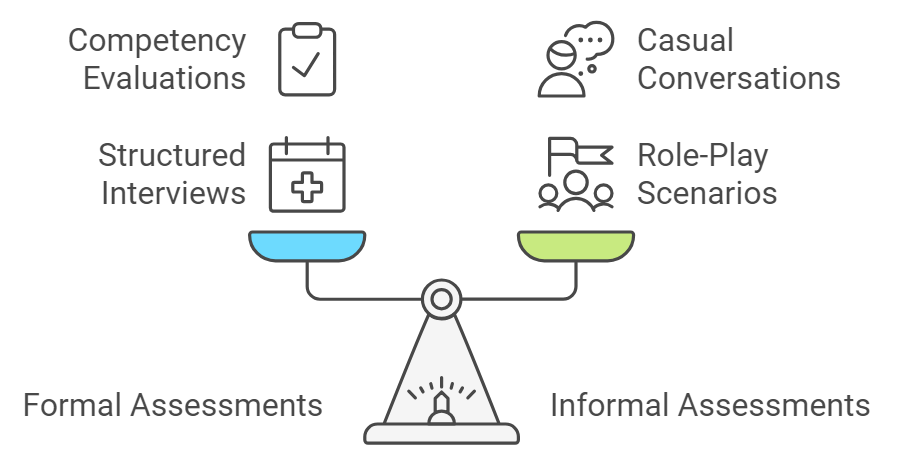The role of a managing director (MD) is pivotal to a company’s success.
As the key executives overseeing the strategic direction, daily operations, and stakeholder relationships, they are responsible for guiding the company toward long-term success.
Proper evaluation of a candidate is essential because the right MD will shape both the strategy and the culture of the organization.
Making a well-informed decision ensures that the company is equipped to meet its goals while fostering a productive and values-aligned environment.
Key Competencies to Evaluate
First, let us see what are the competencies you should evaluate.
1. Strategic Thinking and Vision

A successful managing director must exhibit a forward-thinking vision that is in harmony with the company’s objectives.
It’s essential to assess the candidate’s ability to not only conceptualize a strategic vision but also implement it through specific, measurable long-term goals.
- Industry trends: How well does the candidate understand and anticipate changes in the market?
- Competitor analysis: Do they keep track of competitor moves and adjust strategies accordingly?
- Innovation opportunities: Can they identify and leverage new opportunities to drive the company forward?
A candidate who excels in this area will show a proven track record of making difficult decisions, particularly when it comes to:
- Resource prioritization: Balancing the demands of short-term projects against the company’s long-term objectives.
- Team alignment: Keeping teams focused on a consistent strategic direction while managing various stakeholder expectations.
Key questions to consider during the evaluation process include:
- “Can you describe a time when you set and achieved a strategic goal?”
- “How do you prioritize multiple high-level tasks?”
Their answers will offer insight into their ability to maintain a big-picture outlook while simultaneously managing the details of complex decisions. The ideal managing director will be proactive in identifying both challenges and opportunities early, steering the company in innovative directions to ensure continued growth and sustainability.
2. Decision-Making Skills
Effective decision-making is a fundamental responsibility of a managing director, especially in situations of uncertainty. It’s important to assess how a candidate approaches making informed decisions when data is incomplete or ambiguous.
- Relies solely on data-driven methods
- Combines intuition, experience, and creative thinking
Understanding the candidate’s decision-making process, particularly under high-pressure situations, provides valuable insight into their leadership style and risk tolerance.
An ideal managing director should:
- Balance quantitative analysis with qualitative insights to make well-rounded decisions
- Add diverse perspectives and encourage input from all levels of the organization, ensuring no critical viewpoint is overlooked
To assess their decision-making approach, consider asking:
- “How do you handle major decisions when you have limited information?”
- “How do you involve different perspectives in your decision-making process?”
These questions will help gauge the candidate’s ability to navigate complexity, manage uncertainty, and make decisions that align with the company’s long-term success.
3. Leadership and Team Management

Strong leadership and discipline plays a crucial role in motivating teams, shaping the company’s culture, and delivering results. A managing director must inspire and guide senior leaders while cultivating a collaborative and cohesive work environment.
Assessing the candidate’s ability to handle conflict, build consensus, and develop a strong, accountable executive team is essential for determining their leadership potential.
Evaluating their approach to employee development and mentorship can provide insight into how they nurture talent within the organization.
- Conflict resolution: The ability to navigate and resolve disagreements within executive teams is crucial. Strong leadership requires maintaining harmony while driving progress.
- Consensus building: A successful MD can rally diverse opinions around a common goal, ensuring that everyone is aligned with the company’s strategy.
- Team development: The MD should prioritize the growth of their management team, offering guidance, mentorship, and opportunities for professional development.
- Accountability: Building a culture of responsibility at the executive level ensures that leaders are accountable for their decisions and actions, driving organizational success.
For leadership evaluation, consider asking the following questions:
- “How do you build and lead a successful management team?”
- “Can you provide an example of how you handled internal conflicts?”
Their answers should reveal whether they can:
- Build trust-based relationships within the team.
- Set clear expectations.
- Navigate complex interpersonal dynamics at the executive level.
Successful candidates will demonstrate a track record of team cohesion, where diverse talents and perspectives are effectively aligned to achieve the company’s objectives. This indicates their ability to foster a collaborative environment while delivering results.
4. Cultural Fit and Values Alignment

Ensuring that a managing director’s personal values align with the company’s culture is essential for them to lead the organization effectively. Evaluating this cultural fit is crucial for fostering long-term harmony and success within the organization.
The evaluation should focus on the candidate’s adaptability, integrity, and their ability to positively influence the company’s culture.
- Formal assessments: These might include structured interviews or competency-based evaluations.
- Informal assessments: Role-play scenarios or casual conversations can provide insights into how a candidate behaves in less formal, more dynamic environments, offering a deeper understanding of their cultural adaptability.
Key areas to focus on include:
- Adaptability: How well can the candidate adjust to new challenges or organizational shifts?
- Integrity: Do they uphold the company’s values even in tough situations?
When exploring values alignment, consider asking key questions such as:
- “How do your values align with our company’s vision?”
- “Can you provide examples of how you demonstrated integrity during tough decisions?”
Their responses will reveal whether they are not only a good fit for the company’s current culture but also if they have the capacity to lead cultural transformation when necessary.
A successful MD will:
- Maintain and strengthen the organization’s core values.
- Skillfully navigate cultural changes or crises when they arise.
5. Financial Acumen

Financial management is a crucial competency for any managing director.
- Budgeting: Planning and allocating financial resources efficiently.
- Forecasting: Predicting future financial performance based on current trends and data.
- Resource allocation: Ensuring that financial and operational resources are distributed strategically to maximize growth and profitability.
It’s essential to evaluate whether the candidate can make sound financial decisions that not only drive short-term profitability but also promote long-term sustainability. They should also be proficient in risk management, with experience in navigating financial uncertainties to keep the company competitive within its industry.
When assessing financial acumen, key questions to ask include:
- “How do you manage budgeting and resource allocation?”
- “Can you describe a significant financial decision you’ve made and its outcome?”
These questions will help you determine whether the candidate can handle complex financial challenges effectively while ensuring the company’s fiscal health remains strong.
A managing director should be capable of:
- Analyzing financial data accurately.
- Forecasting trends to prepare for future opportunities or risks.
Making decisions that are in line with the company’s long-term strategic objectives, ensuring a balance between growth and stability.
6. Crisis Management and Problem-Solving Abilities

In times of crisis or during significant organizational changes, a managing director must demonstrate exceptional problem-solving skills and take swift action to mitigate risks. Their ability to lead under pressure, remain calm, and make informed decisions will determine how well the company navigates through challenging situations.
It is crucial to evaluate how the candidate responds to high-stakes environments, as this can directly impact the company’s stability and long-term success.
- Handling Pressure: Can the candidate maintain composure in high-pressure situations? A managing director should exhibit confidence and poise, which are critical for reassuring employees and stakeholders during a crisis.
- Critical Thinking: Does the candidate have the ability to assess a crisis from multiple angles, weighing risks, and benefits before acting? They should quickly identify the root causes and explore potential solutions, even when time is limited.
- Informed Decision-Making: In a crisis, decisions often need to be made without complete information. How does the candidate handle uncertainty? They must strike a balance between intuition and data-driven insights to make the best possible decision under difficult circumstances.
- Resilience and Adaptability: The ability to bounce back from setbacks and pivot strategies when necessary is a vital trait. managing directors should be resilient in their approach, and able to adapt to evolving situations without losing sight of the company’s broader goals.
To assess these competencies, consider asking the following questions:
- “How have you handled a major crisis or significant organizational change in the past?”
- “What strategies do you use for problem-solving in difficult or high-pressure situations?”
The Bottom Line
The right managing director will bring a balanced combination of strategic vision, leadership capabilities, cultural alignment, and financial expertise.
By assessing the key competencies, utilizing structured interviews, and employing objective scorecard evaluations, companies can select a candidate who will effectively guide the organization toward its long-term goals.

